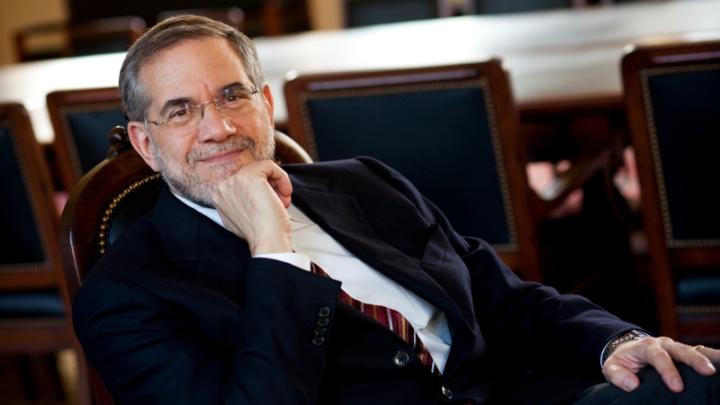Steven E. Hyman, MD '80, a neurobiologist who has served as the University’s provost since 2001, announced today that he would relinquish the post effective at the end of the academic year. The provost position at Harvard was created in its modern form under President Neil L. Rudenstine in 1992; Hyman’s decade of service makes him the longevity champion, and gave him the opportunity to define the position, now at the center of the University’s efforts to facilitate collaborative, interdisciplinary research and teaching. Hyman plans to take a sabbatical year at the Broad Institute, the Harvard-MIT genomics center—he is a professor of neurobiology on the Harvard Medical School (HMS) faculty—to explore returning to active science, and to create a General Education course for undergraduates, on neuroscience, ethics, policy, and law.
In the news release about Hyman’s decision, President Drew Faust said, “I have deeply valued my partnership with Steve. He has spurred fresh thinking and important initiatives in areas ranging from the sciences to the humanities, from the museums to the libraries.…In all of these areas and more, he has approached his role with intelligence, passion, and wit, and with a devotion to the highest academic standards.” Faust said she would launch the search for a successor provost in January.
Early in his career, Hyman was a professor of psychiatry at HMS and served as the first faculty director of the University’s Mind, Brain, and Behavior Initiative. He was subsequently appointed director of the National Institute of Mental Health (1996-2001); during that initial period of administrative service, he maintained a laboratory investigating the molecular basis of gene expression in neurons and continued to publish scientific papers (activities he has had to put aside during his decade as provost). The interfaculty initiative served as a useful introduction to Harvard’s interdisciplinary, multischool programs and projects—a principal focus for his work as provost. Of late, he has been associated with such University-wide initiatives as the effort to rethink the libraries’ operations and administrative organization (for budgetary reasons and to adapt to digital technologies); just last week, he was named to chair the new board of directors for the Harvard library system (a responsibility he will relinquish next June).
Hyman may be best known to the wider University community for his role at the morning Commencement exercises in Tercentenary Theatre, where he reads the lively introduction for each honorary-degree recipient before President Faust reads the citation.
During a conversation in his Massachusetts Hall office on December 14, Hyman described his decision to step down as he entered “the tenth year of a five-year commitment” in personal terms—as a time for more “self-focus.” He indicated to Faust last July, he said, that he thought this should be his last year as provost. During his time as provost, he said, “I have mostly stayed out of searches for other positions outside of Harvard,” and had arrived at the decision that he did not want another administrative position, at least for the near term. “I fell down the administrative well rather early, in mid career” as a scientist, he said. During a sabbatical year at a research institution like the Broad, he said, he hoped to “see what I can do effectively in the sciences” after a long layoff from the laboratory bench; he conceded, smiling, “I may not be rehabilitatable.”
The time also seemed suitable, he continued, because “You shouldn’t walk away from something in bad times,” and the University has emerged from its recent financial challenges (albeit with a diminished endowment) with “a very effective president who is in command, a very strong staff including the vice presidents and certainly with the addition of [executive vice president] Katie Lapp, and we have a remarkably strong cadre of deans.” Finally, he noted later, with a large University capital campaign in the offing, “President Faust deserves in whomever will be provost someone who will serve for the duration, in mint condition.”
When he became provost, Hyman recalled, the office was new at Harvard and consisted of a “collection of projects,” not yet resembling the post of chief academic officer that the title signals at other research universities. Today, he said, it is “well on its way to becoming a modern research university provost’s office, but with a Harvard flavor.” That Crimson coloring strongly reflects the traditional decentralization of the University’s schools. They retain their autonomy, and the provost’s office has strong, direct interactions with each, Hyman said, but “the most important thing we do is to work tirelessly across schools and across disciplines.”
There is a “lot of life left in the disciplines, and lots of rigor,” he added—but it would be curious if knowledge and inquiry today aligned exactly and entirely with departmental and professional-school boundaries established a century ago. Thus the provost’s office supports the departments and schools (for instance, through University-wide efforts to encourage faculty diversity, to support international research and learning, and to oversee research—all of these now directed by vice provosts; for accounts of work on faculty diversity, see here and the forthcoming January-February 2011 Harvard Magazine), but seeks “not to allow them to become limiting intellectual silos. It falls to the provost’s office to facilitate bottoms-up efforts at boundary crossing.” Some 30 interdisciplinary efforts now receive funding from the provost’s office.
In his letter to the community announcing his decision, Hyman wrote, “As provost, I have aimed, above all, to knit together this highly decentralized University in ways that make it greater than the sum of its glorious parts. The world well recognizes Harvard’s overall academic strength, but less well understood is the collaborative spirit of our faculty members and students and their desire to pursue important intellectual and practical problems wherever they lead—often across the boundaries of disciplines or of individual schools.”
As a result, there is the first interschool department (Stem Cell and Regenerative Biology, under the Harvard Stem Cell Institute; see a report on current developments in stem-cell research); the interdisciplinary Wyss Institute for Biologically Inspired Engineering (linking HMS, affiliated hospitals, the School of Engineering and Applied Sciences, and Faculty of Arts and Sciences departments such as chemistry and physics—faculty members from which have just moved into new facilities); and an increasingly University-wide Humanities Center, building on humanities efforts in each school. (Hyman’s own career is an archetype of scientific curiosity and boundary-crossing. A 1974 Yale graduate in philosophy and the humanities, he then journeyed to the University of Cambridge as a Mellon Fellow in the philosophy of science, earning B.A. and M.A. degrees, before turning to medicine.) These collaborations, he said, are “what I am proudest of.”
In the University news release, Gary Gottlieb, president and chief executive officer of Partners HealthCare (parent of Massachusetts General and Brigham and Women’s hospitals), said Hyman had been “a visionary in creating a single campus for Harvard University. His office has allowed the development of close collaboration among the hospitals and the HMS quadrangle faculty and the great scientists and teachers at the main campus of the University. He is passionate, brilliant scientifically, yet he’s a true physician who grew up in the hospitals. He really understands the great strength of all the parts of the University.”
Harvard’s provost also oversees affiliated cultural institutions, ranging from the museums to the American Repertory Theater (ART)—another responsibility not common to provosts elsewhere. Hyman cited with enthusiasm the reconstruction of the Fogg Art Museum, now under way, to “create a true teaching museum,” and the activities of the ART; both institutions’ directors were appointed through searches under Hyman.
Finally, Hyman said, “The greatest privilege for me is chairing committees related to faculty promotion.” Although decisions on tenure ultimately rest with the president, the provost now runs “somewhat more than half” of the review committees, he said—in the heady days before the recent economic difficulties, one per week, across all the faculties. He marveled at “what you can learn” as provost from engaging with the faculty members through those reviews.
Looking ahead, Hyman said his most important piece of unfinished business is ensuring that the restructuring of the library system proceeds and gains momentum. The new University library board has been appointed, an executive director should be named soon, and work will continue to implement the recommendations arrived at during the past year of reviews of the library system’s operations and collecting needs and practices.
What was most fun about the position? First, Hyman said, “working with some remarkably talented and dedicated colleagues who care about institution-building” and about securing the future of the University. Second, he said, defying external views of Harvard as “terminally siloed and tied down like Gulliver,” when instead the University is creating new interdisciplinary units like the regenerative biology department or the Broad Institute itself—“that feels really, really good.” And third, he said, is an opportunity not formally part of the job description: teaching “breathtaking” undergraduates. He cited his teaching in freshman seminars, a neurobiology lecture course, and, more recently, a neurobiology junior tutorial. Those experiences underlie his plan to develop a new neurobiology course for the College’s General Education curriculum.








